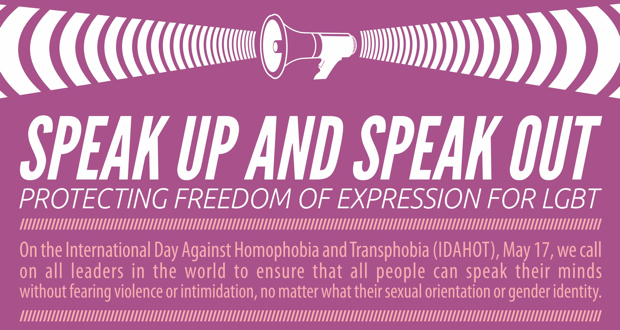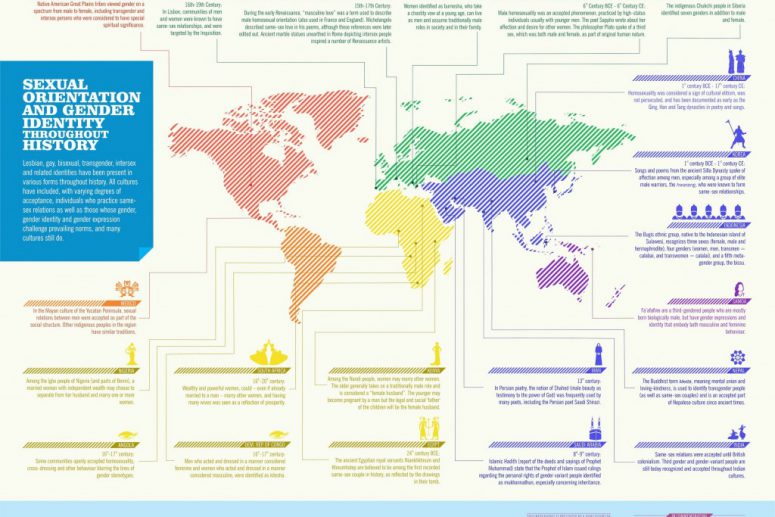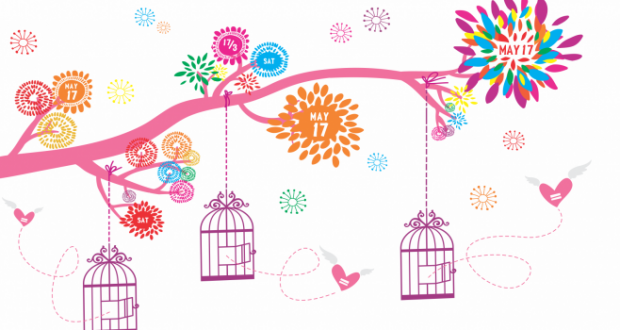This year, activists from around the world had chosen FREEDOM OF EXPRESSION as a core focus issue to mobilise around for the International Day Against Homophobia & Transphobia.
Around the world many initiatives took place to highlight how the fundamental right to freely discuss issues around sexual and gender rights, is systematically being violated by the great majority of states.
As a matter of fact, our calculations reveal that 70% of the people in the world are not allowed by law to discuss, or even receive objective information on, matters related to sexual orientation and gender identity.
Global Call to leaders of the world
Developed in association between IFEX, Article 19 and the IDAHO Committee, and with the support of Amnesty International, the mobilisation included a Global Call to Leaders of the World which was signed by 170 organisations globally and supported by a “Thunderclap” action which reached 1,5 million people.

The call to mobilise on the issue of Freedom of Expression was also heard by the United Nations.
UN human rights experts, the Inter-American Commission on Human Rights, the Special Rapporteur on Human Rights Defenders in Africa of the African Commission on Human and Peoples’ Rights, and the OSCE Representative on Freedom of the Media issued a joint statement which underlines how “Free expression and association is key to eliminating Homophobia and Transphobia”
Activists in dozens of countries spoke up and spoke out for LGBTI Free Expression on May 17
Around the world, many activists joined the call by organising conferences, debates, and seminars on LGBTI Freedom of Expression – from London, to Nairobi, to Rio de Janeiro. Countless demonstrations were organised with free expression at their core – including dance flashmobs, sing-ins, kiss-ins, body & face painting, street art, photography and arts festivals.
Even in the most hostile and contradictory contexts, many activists made the choice to take to the streets to defend LGBTI rights, and to highlight the erasure and silencing of communities in the public sphere. In 13 cities in Russia, activists took to the streets in the largest nationwide demonstration in favour of LGBTI rights since the federal government approved a law limited “homosexual propaganda” last summer – a case which has sparked international outrage.
In the Ukraine, activists decided to confront the distortion of their most basic demands for human rights (as propaganda, or as a tool for extending “Western influence”), in the context of significant political instability and repression. Against the odds, they organised a rainbowflash balloon release on May 18; a day later than planned, due to security concerns.
In Georgia, activists were similarly unable to take action on the 17th itself, due to security concerns and lack of protection guarantees from the Georgian state. After 4,000 supporters of the right-wing & fundamentalist Georgian Orthodox Church departed from Tbilisi city centre, activists painted rainbow street art around the city, and – on the 18th – left more than 100 shoes at the site of last year’s attacks; a way of marking their presence nevertheless, and speaking back to the silencing and repression of LGBTI communities in Georgia.
In some parts of Southern and East Africa, as well as in many parts of Latin America & the Caribeean, whole street festivals and weeks of events were held around the Day, with many actions focusing on LGBTI Freedom of Expression, or accomplishing it – at least for fleeting, but highly symbolic moments.
Although in some parts of East and South-East Asia – as in China – activists faced significant repression in the lead up to the Day (including, in China, arrests of several activists for even planning a May 17 event), many communities were able to join the commemorations. Thailand, Indonesia, Hong Kong, Mongolia, Myanmar, Cambodia, Vietnam and the Philippines saw particularly large scale mobilisations this year – many of them connecting with the global focus on LGBTI Free Expression.
We will be updating this page in the coming days, as we gain a clearer picture of the scope and nature of the, some 1,000+, actions which took place around the IDAHOT 2014.
Further reading:
- IDAHO Committee – Full background info & campaigning kit on the IDAHOT 2014 Global Focus Issue: Freedom of Expression. Download here (pdf, 2mb).
- Parliament Intergroup on LGBT Rights: “Anti-propaganda laws”, the new criminalisation of homosexuality
- Article 19: Traditional values? Attempts to censor sexuality: Homosexual propaganda bans, freedom of expression and equality.
- Human Rights Watch: The Trouble With Tradition
- PEN International: Resolution – The Russian Federation (79th World Congress in Reykjavik, Iceland, Sept 9-12, 2013)
- Index on Censorship/Mathew Brown: Shut the Duck Up
- American Civil Liberties Union: Banned Books Week 2013 – Books about LGBT Families Remain Targets of Censorship



